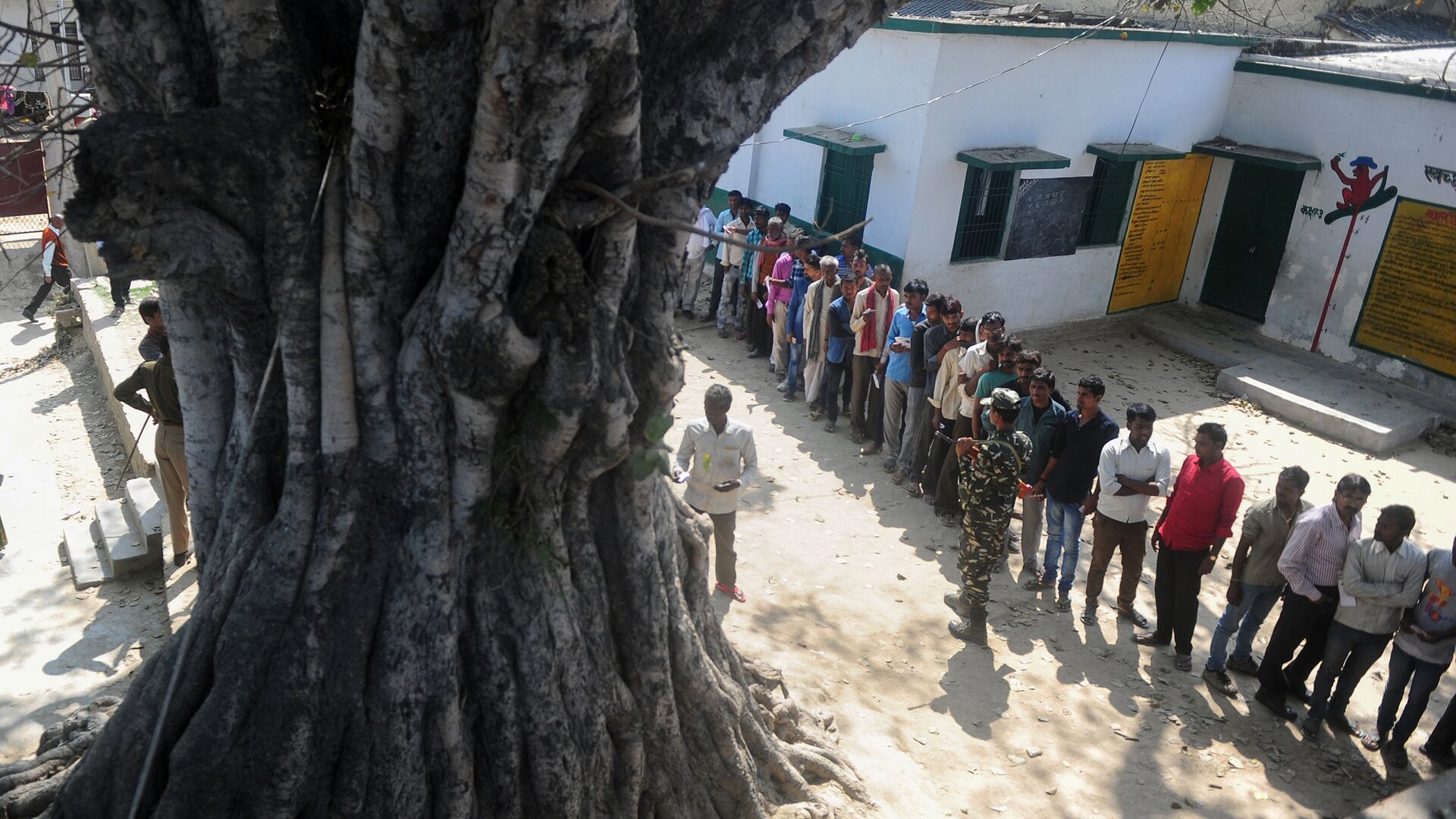https://sputnikglobe.com/20220206/unemployment-farmers-protest-becomes-a-major-headache-for-bjp-in-indias-uttar-pradesh-pundits-1092570557.html
Unemployment, Farmers' Protest Becomes a Major Headache for BJP in India’s Uttar Pradesh: Pundits
Unemployment, Farmers' Protest Becomes a Major Headache for BJP in India’s Uttar Pradesh: Pundits
Sputnik International
The elections in the Indian state of Uttar Pradesh are important as they often foreshadow the parliamentary election results for the country. The forthcoming... 06.02.2022, Sputnik International
2022-02-06T04:00+0000
2022-02-06T04:00+0000
2022-12-10T11:42+0000
elections
bharatiya janata party (bjp)
elections
politics
uttar pradesh
indian national congress
yogi adityanath
congress
https://cdn1.img.sputnikglobe.com/img/105110/87/1051108768_0:153:3011:1847_1920x0_80_0_0_51cbc51a627fdaff3ad0d43423cde6b3.jpg
The electoral battle among various political parties in the Indian state of Uttar Pradesh has intensified ahead of the looming legislative assembly polls.The opposition parties have missed no opportunity to attack the ruling Bharatiya Janata Party (BJP). But the BJP is firmly holding its ground while countering the attacks, as it points to the good work its government has done under Yogi Adityanath's leadership as state chief.However, there may be a lot of problems yet in store for the party until these elections are over.Major Challenges for BJP in Uttar PradeshCiting unemployment as the biggest challenge for the BJP in Uttar Pradesh, political analyst Vinod Shukla says: “There have been various protests by aspiring teachers over recruitment in government schools which the opposition parties will surely try to cash in on during the elections.”He adds that, apart from unemployment, the other challenges which the ruling BJP might face are polarisation of Muslim votes and the affect of the farmers’ protest in the western part of the state, and anti-incumbency.Political expert, Sanjeev Kaushik, agrees with Shukla, and reckons that the BJP will face a major challenge in western Uttar Pradesh as the Jat community in the region is not happy with the party.However, the BJP is trying to woo the Jat community.Federal Home Minister and BJP politician Amit Shah even met prominent Jat leaders in the national capital Delhi. After the meeting, senior party leaders claimed that the community has no grievance with the BJP.Some BJP lawmakers even made an open offer to Jayant Chaudhary, leader of Rashtriya Lok Dal (RLD) and grandson of India's fourth prime minister, stalwart Jat leader Chaudhary Charan Singh, to join the party whenever he wants.Defection to Hurt BJP in State PollsApart from the aforementioned challenges, the defection by several ministers just before the elections might also prove a big headache for the BJP.Three ministers, including Backward Caste leader Swami Prasad Maurya, and 10 lawmakers recently quit ministerial post and BJP’s primary membership, and joined the state’s main opposition party Samajwadi Party.In their resignation announcements, all the ministers said that they were resigning from the BJP because people of dispossessed castes have been neglected by the party.Shukla, however, believes the defection would hardly have any effect on the elections.However, Kaushik isn't nearly so sanguine and says that the defection will indeed come as a blow to the BJP during the assembly elections.“Whereas a leader joining a ruling party is common, someone leaving the ruling party and joining the opposition gives a message that there is a problem within the ruling party. Apart from this, the reasons cited by all the ministers are the same: that the people of dispossessed castes have been neglected which tells the story in itself,” he says.The induction of the ministers who quit the BJP and joined the Samajwadi Party, has given the rival political group greater confidence.Akhilesh Yadav Contesting Polls Intensifies the BattleThe leader of the Samajwadi Party, former state chief of Uttar Pradesh, Akhilesh Yadav, who previously refused to contest the elections, recently announced that he will be fighting the polls after all.He has aggressively attacked the BJP government and state chief Yogi Adityanath for misgovernance.Shukla, though, believes that Akhilesh Yadav has been inspired to fight the election not because he has great belief in himself but rather because of his frustration with the BJP's tactics.But Kaushik takes a different view and feels that Yadav’s decision to contest the polls will increase the sense of confidence among party workers and they will redouble their efforts so that their party secures victory in the elections.In the previous state assembly elections, the BJP won by an overwhelming three-quarter majority of 312 seats out of 403. The Samajwadi Party was restricted to 47 seats, the Bahujan Samaj Party could win only 19, and Congress managed to win seven seats.
uttar pradesh
Sputnik International
feedback@sputniknews.com
+74956456601
MIA „Rosiya Segodnya“
2022
Rahul Trivedi
https://cdn1.img.sputnikglobe.com/img/07e5/05/12/1082926121_0:-1:627:627_100x100_80_0_0_d882e1a63f627c25b7a534fb8b8234d7.jpg
Rahul Trivedi
https://cdn1.img.sputnikglobe.com/img/07e5/05/12/1082926121_0:-1:627:627_100x100_80_0_0_d882e1a63f627c25b7a534fb8b8234d7.jpg
News
en_EN
Sputnik International
feedback@sputniknews.com
+74956456601
MIA „Rosiya Segodnya“
Sputnik International
feedback@sputniknews.com
+74956456601
MIA „Rosiya Segodnya“
Rahul Trivedi
https://cdn1.img.sputnikglobe.com/img/07e5/05/12/1082926121_0:-1:627:627_100x100_80_0_0_d882e1a63f627c25b7a534fb8b8234d7.jpg
elections, bharatiya janata party (bjp), elections, politics, uttar pradesh, indian national congress, yogi adityanath, congress
elections, bharatiya janata party (bjp), elections, politics, uttar pradesh, indian national congress, yogi adityanath, congress
Unemployment, Farmers' Protest Becomes a Major Headache for BJP in India’s Uttar Pradesh: Pundits
04:00 GMT 06.02.2022 (Updated: 11:42 GMT 10.12.2022) The elections in the Indian state of Uttar Pradesh are important as they often foreshadow the parliamentary election results for the country. The forthcoming state assembly elections are slated to be held from 10 February to 7 March in seven phases and the results will be announced on 10 March.
The electoral battle among various political parties in the Indian state of Uttar Pradesh has intensified ahead of the looming
legislative assembly polls.
The opposition parties have missed no opportunity to attack the ruling Bharatiya Janata Party (BJP). But the BJP is firmly holding its ground while countering the attacks, as it points to the good work its government has done under Yogi Adityanath's leadership as state chief.
However, there may be a lot of problems yet in store for the party until these elections are over.
Major Challenges for BJP in Uttar Pradesh
Citing unemployment as the biggest challenge for the BJP in Uttar Pradesh, political analyst Vinod Shukla says: “There have been various protests by aspiring teachers over recruitment in government schools which the opposition parties will surely try to cash in on during the elections.”
He adds that, apart from unemployment, the other challenges which the ruling BJP might face are polarisation of Muslim votes and the affect of the farmers’ protest in the western part of the state, and anti-incumbency.
Political expert, Sanjeev Kaushik, agrees with Shukla, and reckons that the BJP will face a major challenge in
western Uttar Pradesh as the Jat community in the region is not happy with the party.
“In the last elections, the BJP managed to win around 109 seats out of 136 assembly seats but in one year of the farmers’ protest there has been a lot of discontent among the Jat community,” he emphasises.
However, the BJP is trying to woo the Jat community.
Federal Home Minister and BJP politician Amit Shah even met prominent Jat leaders in the national capital Delhi. After the meeting, senior party leaders claimed that the community has no grievance with the BJP.
Some BJP lawmakers even made an open offer to Jayant Chaudhary, leader of Rashtriya Lok Dal (RLD) and grandson of India's fourth prime minister, stalwart Jat leader Chaudhary Charan Singh, to join the party whenever he wants.
Defection to Hurt BJP in State Polls
Apart from the aforementioned challenges, the
defection by several ministers just before the elections might also prove a big headache for the BJP.
Three ministers, including Backward Caste leader Swami Prasad Maurya, and 10 lawmakers recently quit ministerial post and BJP’s primary membership, and joined the state’s main opposition party Samajwadi Party.
In their resignation announcements, all the ministers said that they were resigning from the BJP because people of dispossessed castes have been neglected by the party.
Shukla, however, believes the defection would hardly have any effect on the elections.
According to him, the defection would have had a greater effect if someone who enjoyed a great deal of support had left the party. "But leaders such as Swami Prasad Maurya, who is labelled as party-hopper, won’t have much impact on the elections.”
However, Kaushik isn't nearly so sanguine and says that the defection will indeed come as a blow to the BJP during the assembly elections.
“Whereas a leader joining a ruling party is common, someone leaving the ruling party and joining the opposition gives a message that there is a problem within the ruling party. Apart from this, the reasons cited by all the ministers are the same: that the people of dispossessed castes have been neglected which tells the story in itself,” he says.
The induction of the ministers who quit the BJP and joined the Samajwadi Party, has given the rival political group greater confidence.
Akhilesh Yadav Contesting Polls Intensifies the Battle
The leader of the Samajwadi Party, former state chief of Uttar Pradesh, Akhilesh Yadav, who previously refused to contest the elections, recently announced that he will be fighting the polls after all.
He has aggressively attacked the BJP government and
state chief Yogi Adityanath for misgovernance.
Shukla, though, believes that Akhilesh Yadav has been inspired to fight the election not because he has great belief in himself but rather because of his frustration with the BJP's tactics.
"If he had been confident enough about his victory he would have decided this earlier but he took the decision after the BJP attacked him and his party for not declaring a state chief candidate,” Shukla explains.
But Kaushik takes a different view and feels that Yadav’s decision to contest the polls will increase the sense of confidence among party workers and they will redouble their efforts so that their party secures victory in the elections.
In the previous state assembly elections, the BJP won by an overwhelming three-quarter majority of 312 seats out of 403. The Samajwadi Party was restricted to 47 seats, the Bahujan Samaj Party could win only 19, and Congress managed to win seven seats.




